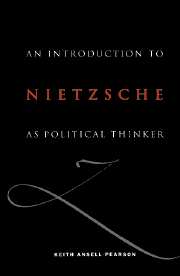Book contents
- Frontmatter
- Contents
- Acknowledgements
- Note on the texts and abbreviations
- Chronology of Nietzsche's life
- Introduction
- A note on Nietzsche and liberalism
- I THE QUESTION OF NIETZSCHE
- 1 A question of style? an introduction to reading Nietzsche
- 2 Nietzsche's legacy
- II ANCIENTS AND MODERNS
- III MAN AND OVERMAN
- IV THE QUESTION OF NIETZSCHE NOW
- Notes
- Bibliography
- Guide to further reading
- Index
2 - Nietzsche's legacy
Published online by Cambridge University Press: 10 November 2009
- Frontmatter
- Contents
- Acknowledgements
- Note on the texts and abbreviations
- Chronology of Nietzsche's life
- Introduction
- A note on Nietzsche and liberalism
- I THE QUESTION OF NIETZSCHE
- 1 A question of style? an introduction to reading Nietzsche
- 2 Nietzsche's legacy
- II ANCIENTS AND MODERNS
- III MAN AND OVERMAN
- IV THE QUESTION OF NIETZSCHE NOW
- Notes
- Bibliography
- Guide to further reading
- Index
Summary
There is no doubt that a ‘thou shalt’ still speaks to us too, that we too still obey a stern law set over us – and this is the last moral law which can still make itself audible to us … we men of conscience who do not want to return to that which is outlived and decayed, to anything ‘unworthy of belief’, be it called God, virtue, truth, justice, charity; we do not permit ourselves any bridges-of-lies to ancient ideals; we are hostile to every kind of faith and Christianness existing today; hostile to all romanticism and fatherland-worship.
Nietzsche, 1886 Preface to DaybreakNIETZSCHE AND THE FATE OF GERMAN POLITICS
As the German historian Golo Mann remarked, Bismarck's Germany was founded not on lofty principles of political philosophy, as was the case with the foundation of the American union, but on brutal pragmatism. The foundation of the German Reich was not preceded by profound philosophical deliberations on the nature of man and society, but by wars, annexations, alliances, and a customs parliament set up by blackmail. Bismarck came to power by announcing that he was opposing the politics of ‘speeches and resolutions’ with a polity of ‘iron and blood’.
Nietzsche wrote his books and espoused his Dionysian philosophy during the years of Bismarck's Germany. He was seventeen when Bismarck came to power, and he descended into madness a year before the Iron Chancellor was dismissed from office. His education at Schulpforta was a classical liberal one.
- Type
- Chapter
- Information
- An Introduction to Nietzsche as Political ThinkerThe Perfect Nihilist, pp. 23 - 60Publisher: Cambridge University PressPrint publication year: 1994



